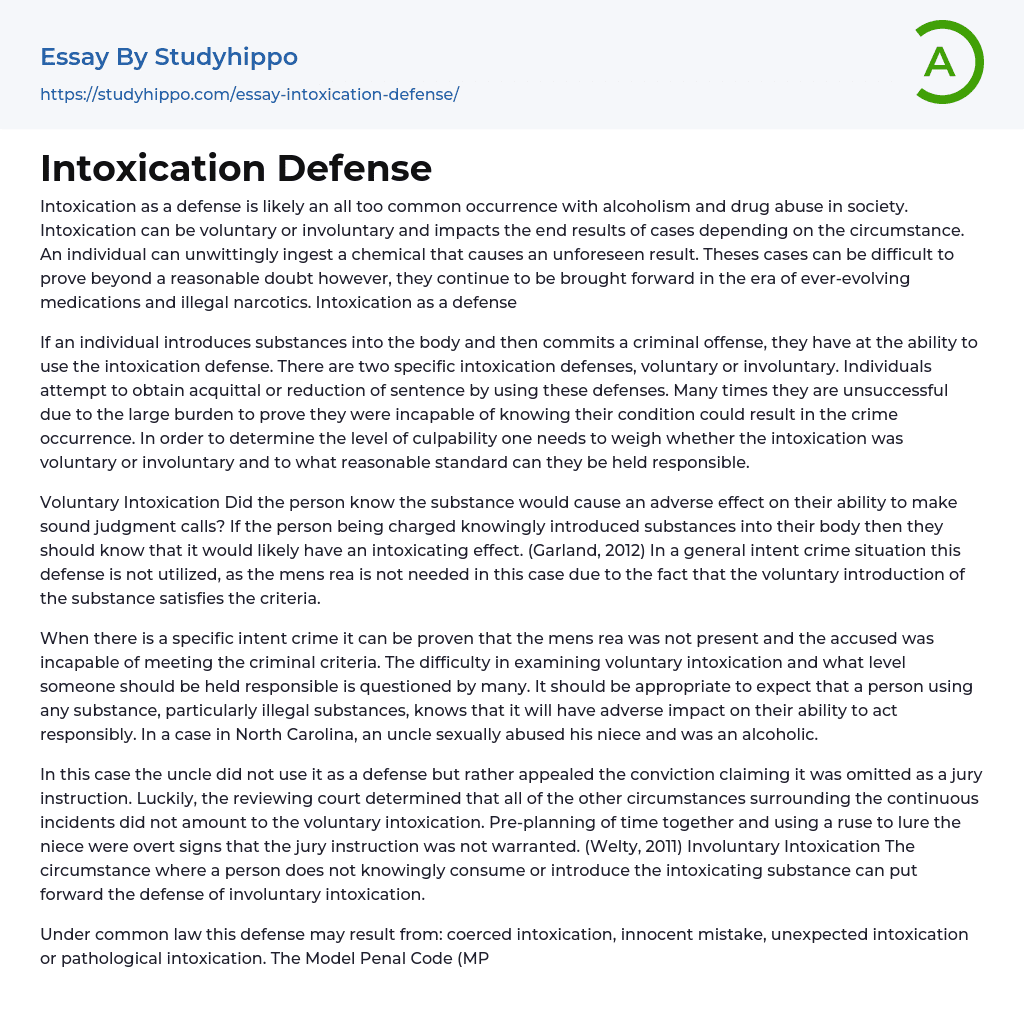Intoxication as a defense is likely an all too common occurrence with alcoholism and drug abuse in society. Intoxication can be voluntary or involuntary and impacts the end results of cases depending on the circumstance. An individual can unwittingly ingest a chemical that causes an unforeseen result. Theses cases can be difficult to prove beyond a reasonable doubt however, they continue to be brought forward in the era of ever-evolving medications and illegal narcotics. Intoxication as a defense
If an individual introduces substances into the body and then commits a criminal offense, they have at the ability to use the intoxication defense. There are two specific intoxication defenses, voluntary or involuntary. Individuals attempt to obtain acquittal or reduction of sentence by using these defenses. Many times they are unsuccessful due t
...o the large burden to prove they were incapable of knowing their condition could result in the crime occurrence. In order to determine the level of culpability one needs to weigh whether the intoxication was voluntary or involuntary and to what reasonable standard can they be held responsible.
Voluntary Intoxication Did the person know the substance would cause an adverse effect on their ability to make sound judgment calls? If the person being charged knowingly introduced substances into their body then they should know that it would likely have an intoxicating effect. (Garland, 2012) In a general intent crime situation this defense is not utilized, as the mens rea is not needed in this case due to the fact that the voluntary introduction of the substance satisfies the criteria.
When there is a specific intent crime it can be proven
that the mens rea was not present and the accused was incapable of meeting the criminal criteria. The difficulty in examining voluntary intoxication and what level someone should be held responsible is questioned by many. It should be appropriate to expect that a person using any substance, particularly illegal substances, knows that it will have adverse impact on their ability to act responsibly. In a case in North Carolina, an uncle sexually abused his niece and was an alcoholic.
In this case the uncle did not use it as a defense but rather appealed the conviction claiming it was omitted as a jury instruction. Luckily, the reviewing court determined that all of the other circumstances surrounding the continuous incidents did not amount to the voluntary intoxication. Pre-planning of time together and using a ruse to lure the niece were overt signs that the jury instruction was not warranted. (Welty, 2011) Involuntary Intoxication The circumstance where a person does not knowingly consume or introduce the intoxicating substance can put forward the defense of involuntary intoxication.
Under common law this defense may result from: coerced intoxication, innocent mistake, unexpected intoxication or pathological intoxication. The Model Penal Code (MPC) simplifies this definition and distinguishes three types: voluntary, pathological and involuntary. (Garland, 2012) Coerced intoxication is introduced through some sort of duress or coercion causing the need to commit the offense. Innocent mistake is when the individual is tricked or unwittingly takes a substance causing the situation.
Unexpected intoxication could result from an adverse reaction to a prescribed medication, even at the appropriate dosage. Pathological intoxication is when the individual is impacted significantly more than reasonable
based upon the amount of consumption. The MPC utilizes voluntary however, incorporates coerced and innocent mistake into the involuntary category. Pathological remains the same for the MPC. STATE v. MARIN In the case of STATE of Iowa, Appellee, v. Kyle Anthony MARIN, Appellant. No. 07-2068, Kyle Marin appealed that involuntary intoxication is a complete defense for his case.
Kyle Marin had surrendered to police in 2006 claiming he was responsible for two murders. The investigation began and showed that the evidence supported this assertion by Marin. In this case Marin claimed he was under the influence of an intoxicant and/or prescription drug. In this case Marin took several Zoloft pills and consumed large quantities of alcohol. Additionally, he had a history of depression and substance abuse problems. The courts rejected his claim and upheld his convictions all the way to the Supreme court. Example of Involuntary Intoxication
A group of friends are at a bar and an unknown person slips a drug into one of the group member’s drink. The drug then has the effect of causing a rage response similar to PCP. This person then commits a series of crimes at the bar and is ultimately arrested. Later, a person comes forward and provides irrefutable evidence of the circumstances surrounding this case. This would be an opportunity for the defendant to be cleared of wrongdoing. However, the person that is now implicated in the drugging of the individual would likely find themselves responsible for all of the other charges as well.
- Criminal Justice System essays
- Agreement essays
- Business Law essays
- Common Law essays
- Community Policing essays
- Constitution essays
- Consumer Protection essays
- Contract essays
- Contract Law essays
- Copyright Infringement essays
- Court essays
- Crime essays
- Criminal Law essays
- Employment Law essays
- Family Law essays
- Injustice essays
- Judge essays
- Jury essays
- Justice essays
- Lawsuit essays
- Lawyer essays
- Marijuana Legalization essays
- Ownership essays
- Police essays
- Property essays
- Protection essays
- Security essays
- Tort Law essays
- Treaty essays
- United States Constitution essays
- War on Drugs essays
- Animal Cruelty essays
- Charles Manson essays
- Crime Prevention essays
- Crime scene essays
- Criminal Justice essays
- Criminology essays
- Cyber Crime essays
- Damages essays
- Detention essays
- Distracted Driving essays
- Drug Trafficking essays
- Drunk Driving essays
- Forensic Science essays
- Gang essays
- Hate Crime essays
- Homicide essays
- Identity Theft essays
- Juvenile Crime essays
- Juvenile Delinquency essays




